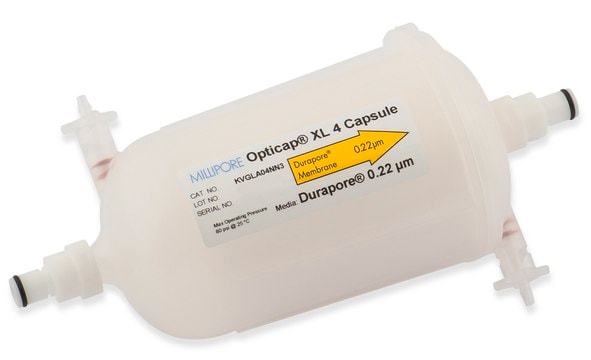KVVLA2TTH1
Durapore® 0.1 µm, Opticap® XLT Capsule
Opticap® XLT 20, cartridge nominal length 20 in. (50 cm), filter diam. 4.2 in. (10.7 cm)
About This Item
Recommended Products
material
polypropylene filter
polypropylene housing
polypropylene support
silicone seal
Quality Level
reg. compliance
FDA 21CFR177-182 (all component materials)
sterility
non-sterile
sterilization compatibility
autoclavable compatible
product line
Opticap® XLT 20
feature
hydrophilic
manufacturer/tradename
Opticap®
parameter
≤40 mL/min air diffusion at 3.9 bar (56 psig) and 23 °C (in water)
1 bar max. inlet pressure (15 psi) at 80 °C
1.7 bar max. differential pressure (25 psid) at 80 °C (Forward:)
2.8 bar max. inlet pressure (40 psi) at 60 °C
25 °C max. inlet temp.
3.5 bar max. differential pressure (50 psid) at 25 °C (Reverse; intermittent)
5.5 bar max. differential pressure (80 psid) at 25 °C (Forward:)
5.5 bar max. inlet pressure (80 psi) at 23 °C
80 psig max. inlet pressure
technique(s)
sterile filtration: suitable
W
6.9 in.
cartridge nominal length
20 in. (50 cm)
device L
62.5 cm (24.6 in.)
device size
20 in.
filter diam.
4.2 in. (10.7 cm)
filtration area
1.4 m2
inlet connection diam.
1-1/2 in.
inlet to outlet width
17.5 cm (6.9 in.)
outlet connection diam.
5/8 in.
impurities
≤0.5 EU/mL bacterial endotoxins (LAL test, aqueous extraction)
<0.5 EU/mL bacterial endotoxins (LAL test, sample aqueous extraction)
matrix
Durapore®
pore size
0.1 μm pore size
bubble point
≥4830 mbar (70 psig), air with water at 23 °C
fitting
16 mm (5/8 in.) fitting (hose barb inlet/oulet)
38 mm (1 1/2 in.) fitting (sanitary flange inlet/oulet)
1/4 in. fitting (vent/drain hose barb with double O-ring seal)
(38 mm (1 1/2 in.) Sanitary Flange Inlet and 16 mm (5?8 in.) Hose Barb Outlet)
Looking for similar products? Visit Product Comparison Guide
General description
Packaging
Preparation Note
3 autoclave cycles of 60min at 126°C; not in-line steam sterilizable
This product was manufactured with a Durapore® membrane which meets the criteria for a "non-fiber releasing" filter as defined in 21CFR210.3(b)(6).
Analysis Note
Other Notes
- Organism Retention: Microorganism
- Mode of Action: Filtration (size exclusion)
- Application: BioProcessing
- Intended Use: Reduction or removal of microorganism/bioburden
- Instructions for Use: Please refer Wetting Instructions for Filter Units with Durapore® Membrane user guide
- Storage Statement: Store in dry location
- Disposal Statement: Dispose of in accordance with applicable federal, state and local regulations
Legal Information
Not finding the right product?
Try our Product Selector Tool.
Certificates of Analysis (COA)
Search for Certificates of Analysis (COA) by entering the products Lot/Batch Number. Lot and Batch Numbers can be found on a product’s label following the words ‘Lot’ or ‘Batch’.
Already Own This Product?
Find documentation for the products that you have recently purchased in the Document Library.
Articles
Before adoption of single-use technologies in biomanufacturing, manufacturers must assess the risk to the drug product from potential leachables. This article highlights a general approach based on the United States Pharmacopeia (USP).
This page provides an overview of USP <87>, <88>, and <1031>, compares bioreactivity testing, and describes the transition of our organization towards in vitro test methods.
Our team of scientists has experience in all areas of research including Life Science, Material Science, Chemical Synthesis, Chromatography, Analytical and many others.
Contact Technical Service






